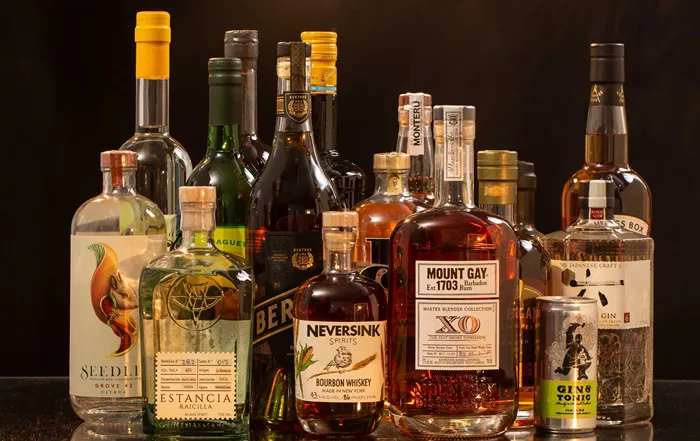When it comes to alcoholic beverages, the comparison between gin and whiskey often arises, with enthusiasts and novices alike pondering, “Is gin stronger than whiskey?” This question delves into not only the alcoholic content but also the nuances of flavor, production methods, and cultural significance. In this article, we’ll dissect the intricacies of gin and whiskey, shedding light on their respective strengths and characteristics.
Understanding Alcohol Content: Proof and Percentage
Before delving deeper into the comparison, it’s crucial to grasp the measurement of alcohol content. In the United States, alcohol content is commonly expressed in terms of “proof,” which is twice the percentage of alcohol by volume (ABV). For instance, a spirit with 40% ABV would be 80 proof. Now, to address the burning question, “Is gin stronger than whiskey?” we must examine the typical alcohol content of each.
Gin is a spirit primarily distilled from juniper berries and other botanicals. It typically boasts an ABV ranging from 35% to 50%, or 70 to 100 proof. Conversely, whiskey, whether it’s Scotch, bourbon, rye, or another variant, generally falls within a similar ABV range, typically ranging from 40% to 50%, or 80 to 100 proof. So, in terms of alcohol content, gin and whiskey stand on relatively equal footing, debunking the notion that gin is inherently stronger than whiskey.
The Essence of Gin: Botanicals and Distillation
To truly comprehend the essence of gin and its position in the spectrum of spirits, it’s essential to delve into its production process and botanical composition. Unlike whiskey, which derives its character primarily from fermented grain mash, gin’s defining feature lies in the infusion of botanicals during distillation.
Gin’s botanical recipe can vary significantly among distillers, with juniper berries serving as the cornerstone ingredient, lending gin its distinctive piney flavor. Additional botanicals such as coriander, citrus peels, angelica root, and cardamom contribute to the complexity of flavors found in gin.
The process of distillation further amplifies these botanical essences, resulting in a spirit with a broad spectrum of flavors and aromas. However, despite its diverse botanical profile, gin’s alcohol content remains comparable to that of whiskey. Thus, while gin offers a unique flavor profile, it does not inherently possess a higher alcohol content than whiskey.
See Also: what alcohol goes with indian food
Exploring Whiskey: Grains, Barrels, and Terroir
In contrast to gin’s botanical infusion, whiskey derives its character from a combination of grains, fermentation, and aging in wooden barrels. Each type of whiskey—be it Scotch, bourbon, or rye—has its own distinct recipe and production process, resulting in a wide array of flavors and aromas.
Scotch whisky, for example, is typically made from malted barley and aged in oak barrels, imparting a rich, smoky flavor profile. Bourbon, a quintessential American spirit, predominantly features corn in its mash bill, contributing to its sweet and robust character. Rye whiskey, on the other hand, is characterized by the spicy kick derived from its high rye content.
Furthermore, the aging process plays a pivotal role in shaping whiskey’s flavor profile. As whiskey matures in oak barrels, it undergoes chemical reactions that mellow harsh flavors and imbue the spirit with additional complexity. However, despite these variations in flavor and aging, whiskey’s alcohol content remains consistent with that of gin.
Cultural Significance and Consumption Patterns
Beyond their respective production methods and flavor profiles, gin and whiskey hold distinct places in the cultural fabric of societies around the world. Gin, with its roots tracing back to 17th-century Holland, has endured periods of prohibition and resurgence, evolving from its humble beginnings as a medicinal tonic to a beloved cocktail staple.
In contrast, whiskey has woven itself into the tapestry of numerous cultures, each imbuing the spirit with its own traditions and rituals. From the peat-laden shores of Islay to the bourbon-soaked hills of Kentucky, whiskey serves as a conduit for storytelling, celebration, and camaraderie.
Despite their cultural significance, the question remains: “Is gin stronger than whiskey?” From a cultural standpoint, the answer lies not in alcohol content but rather in personal preference and societal norms.
Mixology and Versatility
One cannot discuss gin and whiskey without delving into the realm of mixology. Both spirits serve as foundational ingredients in an endless array of cocktails, each contributing its unique flavor profile to the final concoction.
Gin’s botanical complexity lends itself well to a wide range of cocktails, from the classic Gin and Tonic to the elegant Martini. Its versatility allows bartenders to experiment with different flavor combinations, resulting in innovative and refreshing libations.
Conversely, whiskey’s bold and robust character forms the backbone of timeless classics such as the Old Fashioned and the Manhattan. Its depth of flavor adds complexity and depth to cocktails, making it a favorite among aficionados and novices alike.
While gin and whiskey each bring their own distinct characteristics to the world of mixology, neither spirit reigns supreme in terms of potency. Instead, their strength lies in their ability to elevate cocktails and create memorable drinking experiences.
Conclusion: Strength in Diversity
In conclusion, the question of whether gin is stronger than whiskey transcends mere alcohol content. While gin and whiskey differ in terms of production methods, flavor profiles, and cultural significance, their alcohol content remains relatively similar. Gin’s botanical infusion and whiskey’s grain mash each contribute to a rich tapestry of flavors and aromas, making them beloved spirits in their own right.
So, the next time you find yourself pondering, “Is gin stronger than whiskey?” remember that strength is subjective. Whether you prefer the nuanced botanicals of gin or the bold flavors of whiskey, both spirits offer something unique and deserving of appreciation. Ultimately, it’s not a matter of strength but rather a celebration of diversity in the world of spirits. Cheers!


